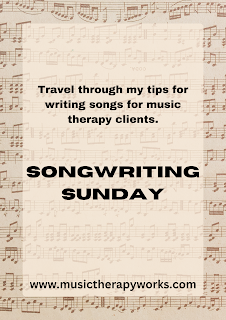Songwriting Sunday: Taking Some Time

I would really like to have some dedicated time to work on my songwriting, but I just don't do it. This is a situation where my brain thinks something that my heart just isn't interested in. My brain has many of these types of thoughts. Writing songs, even the types of songs that I write, takes time. There is no way around that. To get a song from concept to print, it takes time. I need at least an hour to take an idea from concept all the way to publication every time I sit down to write TMEs or just to write songs. Now, my songs are not complicated. They tend to be no more than 30-36 measures, they have lots of replicated elements, and my music is not extremely sophisticated. That is what my clients respond to the most, so that's what I write. Easy songs for my clients to understand and to sing. So, if my songs take at least an hour, imagine what the songwriting experience is like for longer, more complex songs. One of the things that I have learned through my songwriting...

















